| Listing 1 - 10 of 16 | << page >> |
Sort by
|
Book
ISBN: 1501757393 1609090888 9781609090883 9781501757396 9780875806921 0875806929 Year: 2021 Publisher: Ithaca, NY
Abstract | Keywords | Export | Availability | Bookmark
 Loading...
Loading...Choose an application
- Reference Manager
- EndNote
- RefWorks (Direct export to RefWorks)
Parading Patriotism covers a critical fifty-year period in the nineteenth-century when the American nation was starting to expand and cities across the Midwest were experiencing rapid urbanization and industrialization. Historian Adam Criblez offers a unique and fascinating study of five midwestern cities—Chicago, Cincinnati, Cleveland, Columbus, and Indianapolis—and how celebrations of the Fourth of July in each of them formed a microcosm for the country as a whole in defining and establishing patriotic nationalism and new conceptions of what it was like to be an American.Criblez exposes a rich tapestry of mid-century midwestern social and political life by focusing on the nationalistic rites of Independence Day. He shows how the celebratory façade often masked deep-seated tensions involving such things as race, ethnicity, social class, political party, religion, and even gender. Urban celebrations in these cities often turned violent, with incidents marked by ethnic conflict, racial turmoil, and excessive drunkenness. The celebration of Independence Day became an important political, cultural, and religious ritual on social calendars throughout this time period, and Criblez illustrates how the Midwest adapted cultural developments from outside the region—brought by European immigrants and westward migrants from eastern states like New York, Virginia, and Massachusetts. The concepts of American homegrown nationalism were forged in the five highlighted midwestern cities, as the new country came to terms with its own independence and how historical memory and elements of zealous and belligerent patriotism came together to construct a new and unique national identity.This ground-breaking book draws on both unpublished sources (including diaries, manuscript collections, and journals) and copious but under-utilized print resources from the region (newspapers, periodicals, travelogues, and pamphlets) to uncover the roots of how the Fourth of July holiday is celebrated today. Criblez's insightful book shows how political independence and republican government was promoted through rituals and ceremonies that were forged in the wake of this historical moment.
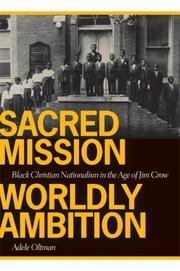
ISBN: 1282552929 9786612552922 0820336610 9780820336619 0820330361 9780820330365 Year: 2008 Publisher: Athens University of Georgia Press
Abstract | Keywords | Export | Availability | Bookmark
 Loading...
Loading...Choose an application
- Reference Manager
- EndNote
- RefWorks (Direct export to RefWorks)
Black power --- Black nationalism --- African Americans --- African American nationalism --- Religion. --- Civil rights --- Economic conditions --- Race identity --- Savannah (Ga.) --- Church history.
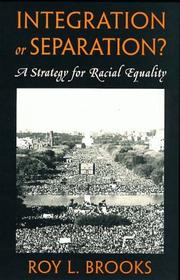
ISBN: 0674028856 9780674028852 0674132955 9780674132955 0674456459 9780674456457 Year: 2022 Publisher: Cambridge, MA
Abstract | Keywords | Export | Availability | Bookmark
 Loading...
Loading...Choose an application
- Reference Manager
- EndNote
- RefWorks (Direct export to RefWorks)
Integrated in principle, segregated in fact: is this the legacy of fifty years of "progress" in American racial policy? Is there hope for much better? Roy L. Brooks, a distinguished professor of law and a writer on matters of race and civil rights, says with frank clarity what few will admit--integration hasn't worked and possibly never will. Equally, he casts doubt on the solution that many African-Americans and mainstream whites have advocated: total separation of the races. This book presents Brooks's strategy for a middle way between the increasingly unworkable extremes of integration and separation. Limited separation, the approach Brooks proposes, shifts the focus of civil rights policy from the group to the individual. Defined as cultural and economic integration within African-American society, this policy would promote separate schooling, housing, and business enterprises where needed to bolster the self-sufficiency of the community, without trammeling the racial interests of individuals inside or outside of the group, and without endangering the idea of a shared Americanness. But all the while Brooks envisions African-American public schools, businesses, and communities redesigned to serve the enlightened self-interest of the individual. Unwilling to give up entirely on racial integration, he argues that limited separation may indeed lead to improved race relations and, ultimately, to healthy integration. This book appears at a crucial time, as Republicans dismantle past civil rights policies and Democrats search for new ones. With its alternative strategy and useful policy ideas for bringing individual African-Americans into mainstream society as first-class citizens, Integration or Separation? should influence debate and policymaking across the spectra of race, class, and political persuasion.
African Americans --- Black nationalism --- African American nationalism --- Civil rights. --- Race identity --- United States --- Race relations. --- Race question --- Civil rights --- Race relations
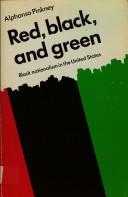
ISBN: 0521208874 0521294592 0511562284 0511864876 Year: 1976 Publisher: Cambridge : Cambridge University Press,
Abstract | Keywords | Export | Availability | Bookmark
 Loading...
Loading...Choose an application
- Reference Manager
- EndNote
- RefWorks (Direct export to RefWorks)
From the first slaves who rose up against their master in the early period of American history to the prominent modern figures such as Malcolm X, Elijah Muhammed, Eldridge Cleaver, Red, Black, and Green traces the origins, the struggles and the accomplishments of black nationalism. Its broad discussion of the ideology of black nationalism and of the conditions that gave rise to this ideology provides the foundation for a thorough account of the black nationalist movement in the peak years of its momentum, roughly the decade 1963 to 1973. The author deals both with specific milestones, such as Marcus Garvey's Universal Negro Improvement Association in the early twentieth century, and with the far-reaching implications of the movement for the black community and for the United States as a whole. He looks at the many facets of black nationalism - revolutionary nationalism, cultural nationalism, religious nationalism, and educational nationalism - analyses the relationship between this movement and liberation movements in general.
Black nationalism --- African Americans --- History. --- United States --- Race relations. --- Arts and Humanities --- History --- African Americans history --- history --- African American nationalism --- Race identity
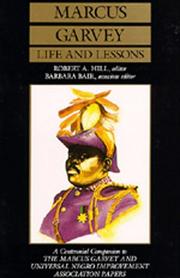
ISBN: 0520908716 058512020X 9780520908710 9780585120201 0520062140 9780520062146 0520062655 9780520062658 Year: 1987 Publisher: Berkeley University of California Press
Abstract | Keywords | Export | Availability | Bookmark
 Loading...
Loading...Choose an application
- Reference Manager
- EndNote
- RefWorks (Direct export to RefWorks)
"I do not speak carelessly or recklessly but with a definite object of helping the people, especially those of my race, to know, to understand, and to realize themselves."--Marcus Garvey, Halifax, Nova Scotia, 1937 A popular companion to the scholarly edition of The Marcus Garvey and Universal Negro Improvement Association Papers, this volume is a collection of autobiographical and philosophical works produced by Garvey in the period from his imprisonment in Atlanta to his death in London in 1940.
African Americans --- Black nationalism --- NON-CLASSIFIABLE. --- African American nationalism --- Negritude --- Biography. --- Race identity. --- United States. --- Race identity --- Ethnic identity --- Garvey, Marcus, --- Universal Negro Improvement Association. --- Garvey, Marcus Mosiah, --- UNIA
Book
ISBN: 0813934877 9780813934877 9780813934860 0813934869 Year: 2013 Publisher: Charlottesville : University of Virginia Press,
Abstract | Keywords | Export | Availability | Bookmark
 Loading...
Loading...Choose an application
- Reference Manager
- EndNote
- RefWorks (Direct export to RefWorks)
Despite the frequent characterization of the dissenting integrationists as Uncle Toms or establishment intellectuals, a misrepresentation that has marginalized them in the intervening decades, Lackey argues that they had their own compelling vision for black empowerment and sociopolitical integration.
African Americans --- Black nationalism --- African American nationalism --- Afro-Americans --- Black Americans --- Colored people (United States) --- Negroes --- Africans --- Ethnology --- Blacks --- Negritude --- Race identity. --- Cultural assimilation. --- Race identity --- Ethnic identity --- Hastie Group. --- Haverford Group --- United States --- Race relations. --- Race question --- Black people
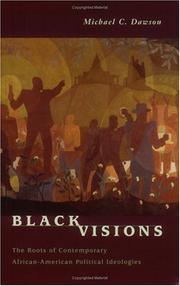
ISBN: 0226138615 0226138607 Year: 2001 Publisher: Chicago, IL : University of Chicago Press,
Abstract | Keywords | Export | Availability | Bookmark
 Loading...
Loading...Choose an application
- Reference Manager
- EndNote
- RefWorks (Direct export to RefWorks)
African Americans --- Black nationalism --- Feminism --- Socialism --- African American nationalism --- Afro-Americans --- Black Americans --- Colored people (United States) --- Negroes --- Politics and government --- Politics and government&delete& --- Philosophy --- Race identity&delete& --- Political aspects --- United States --- Race relations --- Political aspects. --- Africans --- Ethnology --- Blacks --- Race identity --- Black people --- BLACKS --- U.S. --- RACE RELATIONS --- BLACK NATIONALISM --- RACE IDENTITY --- POLITICS AND GOVERNMENT

ISBN: 0822329735 0822329824 9780822329824 9780822329732 9786613064073 1283064073 0822383888 Year: 2002 Publisher: Durham, NC : Duke University Press,
Abstract | Keywords | Export | Availability | Bookmark
 Loading...
Loading...Choose an application
- Reference Manager
- EndNote
- RefWorks (Direct export to RefWorks)
Black Nationalism in the New World combines geography, political economy, and subaltern studies in readings of noncanonical literary works, which in turn illuminate debates over African-American and West Indian culture, identity, and politics. In addition to Martin Delany's Blake; or The Huts of America, Carr focuses on Crown Jewel, R. A. C. de Boissière's novel of the Trinidadian revolt against British rule; Pauline Hopkins's Contending Forces; Wilson Harris's Guyana Quartet; the writings of the Oakland Black Panthers-- particularly Huey Newton, Bobby Seale, and Eldridge Cleaver; the gay novella Just Being Guys Together; and Lionheart Gal, a collection of patois testimonials assembled by Sistren, a radical Jamaican women's theater group active in the 1980s.
Black nationalism --- African Americans --- Blacks --- Negroes --- Ethnology --- Black separatism --- Nationalism --- Nationalism, Black --- Separatism, Black --- Black power --- Negritude --- African American nationalism --- Race identity --- Politics and government --- Ethnic identity --- Black persons --- Black people --- Race identity. --- NATIONALISME NOIR --- NOIRS AMERICAINS --- NOIRS --- ETATS-UNIS --- IDENTITE ETHNIQUE --- ANTILLES
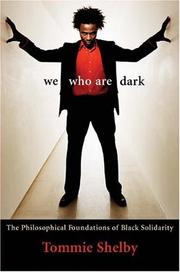
ISBN: 0674019369 9780674019362 Year: 2005 Publisher: Cambridge Belknap press of Harvard university press
Abstract | Keywords | Export | Availability | Bookmark
 Loading...
Loading...Choose an application
- Reference Manager
- EndNote
- RefWorks (Direct export to RefWorks)
African Americans --- Black nationalism --- Black power --- Ethnicity --- Racism --- Ethnic identity --- Group identity --- Cultural fusion --- Multiculturalism --- Cultural pluralism --- African American nationalism --- Negritude --- Politics and government --- Race identity --- Social conditions --- Political aspects --- Civil rights --- Economic conditions --- United States --- Race relations --- Political aspects. --- Social problems --- Sociology of minorities --- United States of America
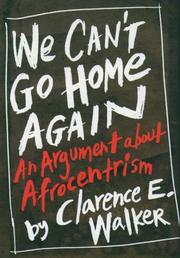
ISBN: 1280527986 0195357302 0195301838 9780195357301 0195095715 9780195095715 9786610527984 6610527989 0197717829 0190282584 Year: 2001 Publisher: New York : Oxford University Press,
Abstract | Keywords | Export | Availability | Bookmark
 Loading...
Loading...Choose an application
- Reference Manager
- EndNote
- RefWorks (Direct export to RefWorks)
An eloquent, pithy, and impassioned broadside against Afrocentrism by a leading African-American historian.
African Americans --- Afrocentrism. --- Black nationalism --- Civilization --- African American nationalism --- Afrocentricity --- Civilization, Western --- Ethnocentrism --- Negritude --- Afro-Americans --- Black Americans --- Colored people (United States) --- Negroes --- Africans --- Ethnology --- Blacks --- History --- Philosophy. --- Race identity. --- Egyptian influences. --- Race identity --- African influences --- Ethnic identity --- Egypt --- United States --- Race relations. --- Race question --- Afrocentrism --- Race relations --- To 332 B.C. --- Philosophy --- Egyptian influences --- Black people --- Ethnic identity.
| Listing 1 - 10 of 16 | << page >> |
Sort by
|

 Search
Search Feedback
Feedback About UniCat
About UniCat  Help
Help News
News